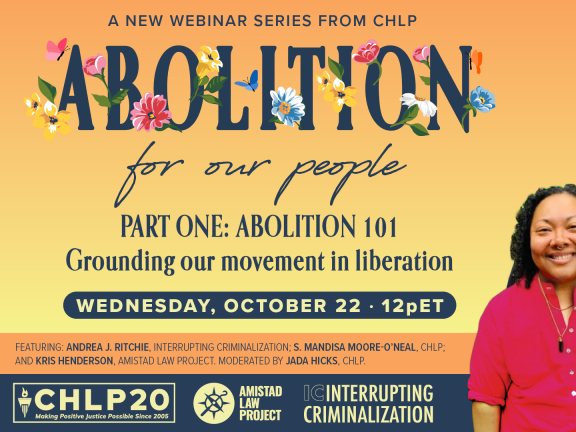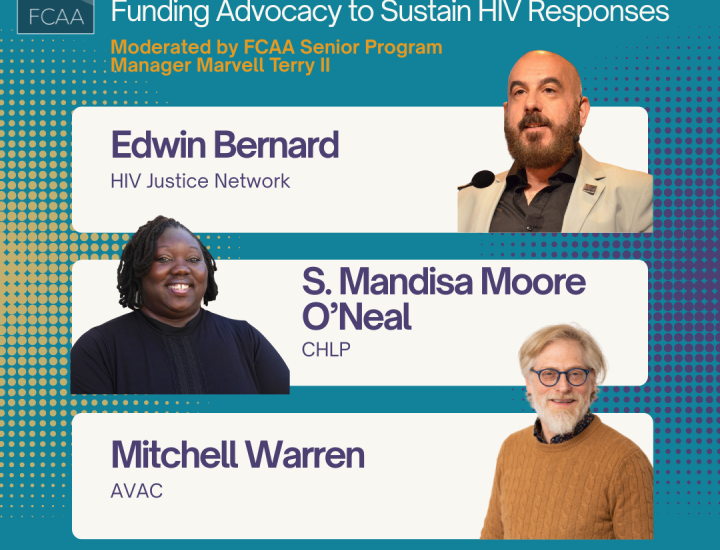Abolition for our people: Abolition 101 - Grounding our movement in liberation

Across the country, people living with HIV are still being criminalized, punished, and denied care through discriminatory laws, sensationalized prosecutions, and harmful policies that defund the very systems meant to support them. These injustices demand that we act.
At the same time, abolitionist movements are rising – challenging carceral thinking and reimagining what real justice looks like. They show us that true safety grows from accountability and investments in care, housing, health, and community – not punishment.
As an abolitionist organization, CHLP works to confront these harms by advancing approaches that do not punish, stigmatize, or oppress, but that center healing and dignity for people living with HIV.
Join us on this shared path of grounding and growing our work and our movement in abolitionist thinking and values. Starting this fall, CHLP will host a dynamic five-part webinar series for advocates where together, we’ll explore what it means to build justice that heals rather than harms, and to create systems rooted in care, accountability, and collective liberation for our people.
We’ll begin with “Abolition 101,” featuring abolitionist organizers who will ground us in what abolition means and how it shapes our collective movement.
This webinar will explore the roots of the modern abolitionist movement and its fight to dismantle the prison-industrial complex (PIC) – a struggle led by Black, queer feminist activists and scholars. Panelists will trace the movement’s history and share how abolitionists are confronting systems of policing and punishment while reimagining ways to provide accountability, care, and healing that will better promote the health and safety of our communities.
Together, they will define key terms and concepts, establish a shared political framework, and set the stage for future discussions on advancing justice by challenging harmful laws, policies, and practices that marginalize and oppress people living with HIV.
Our panelists will engage in conversation on strategies to resist ongoing policing and surveillance and to confront the systemic defunding of public health. The session will provide space to develop a deeper grounding in abolitionist thought and practical insight into how these principles can inform advocacy, public health, and community care.
The abolitionist organizers joining us for this conversation are:
- S. Mandisa Moore-O’Neal, Executive Director, CHLP. She is a Black feminist civil rights attorney, a trained facilitator, and a cultural and political strategist based in New Orleans.
- Andrea J. Ritchie, Founder, Interrupting Criminalization. She is a Black lesbian immigrant survivor who has been documenting, organizing, advocating, litigating, and agitating around policing and criminalization of Black women, girls, trans, and gender nonconforming people for the past three decades.
- Kris Henderson, Co-Executive Director, Amistad Law Project. They are a movement lawyer, a co-founder of Amistad, and a co-founding member of the Coalition to Abolish Death By Incarceration.
- Moderator: Jada Hicks, Senior PJP Attorney, CHLP.
Four follow-up webinars will dig deeper into how we at CHLP apply abolitionist principles in our work – exploring HIV criminalization, health data privacy, transformative and restorative justice practices, and cross-movement organizing. Advocates of all levels and curiosity are welcome.
Save the date: Thursday, December 4
Cultivating positive justice: Ending HIV criminalization through principled coalition-based advocacy
This second installment will explore how abolitionist principles are taking root in the fight to end the criminalization of people living with HIV and other stigmatized health conditions. From the groundwork set in Abolition 101, this conversation will connect theory to practice, examining what it means to challenge systems of policing, punishment, and surveillance through the lens of HIV justice and advocacy.

